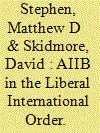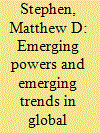|
|
|
Sort Order |
|
|
|
Items / Page
|
|
|
|
|
|
|
| Srl | Item |
| 1 |
ID:
170417


|
|
|
|
|
| Summary/Abstract |
The rise of China raises fundamental questions about the future of the liberal international order (LIO) at a time when it is under ever more strain. Although China’s focus for some years was on joining and participating in existing multilateral institutions, today China is increasingly building its own. Prominent among them is the Asian Infrastructure Investment Bank (AIIB), launched in late 2014. Against the background of contending theoretical expectations, this article examines the extent to which the AIIB either reinforces or challenges the LIO and highlights what this tells us about China’s broader relationship with the LIO. We provide a definition of the LIO that is based on its social purpose rather than on its formal characteristics. State-centric approaches offer insights into China’s decision to engage in new institution building via the AIIB, but we argue that a focus on social purpose is necessary to assess the AIIB’s broader implications for the LIO. We find that, while conforming in large measure to existing institutional models, the AIIB promotes China’s integration into global social networks, strengthens state-led development pathways, and is associated with the Chinese norm of non-interference. The AIIB, thus, foreshadows the possibility of an institutionalised international order indifferent to liberalism. In sum, the AIIB reflects the tensions between the socialising effects of the LIO and China’s growing externalisation of its own non-liberal, state-led model of political economy.
|
|
|
|
|
|
|
|
|
|
|
|
|
|
|
|
| 2 |
ID:
154716


|
|
|
|
|
| Summary/Abstract |
In the 1990s, liberal optimism permeated the study and practice of international politics. International institutions were strengthened and the discourse and practice of global governance consolidated as a new approach to world affairs. Today, new powers are emerging in this institutionalized order. New powers have changed the power relations that underpinned global governance and are also economically, politically, and culturally different from established powers. Against this backdrop, this article investigates the impacts emerging powers are having on global governance. It presents six major trends and outlines their implications for the new global governance currently taking shape. Because new powers are emerging in an already institutionalized order, the emerging global governance order is gradually growing out of the existing one. Emerging powers are rendering parts of global governance dysfunctional, layering onto it, complicating it, but not overthrowing it.
|
|
|
|
|
|
|
|
|
|
|
|
|
|
|
|
| 3 |
ID:
160083


|
|
|
|
|
| Summary/Abstract |
Despite ubiquitous calls for their reform, international organizations (IOs) often suffer from legitimacy deficits. What explains the emergence of legitimacy deficits and what effects do they produce? This article discusses the gradual emergence of legitimacy deficits through the concept of legitimacy drift. Legitimacy drift occurs when an organization loses legitimacy by failing to adapt itself to a changing environment. It identifies three sources of legitimacy drift: failure to live up to pre-existing standards (broken promises), changes in the standards of legitimacy by which organizations are assessed (shifting standards), and changes in an organization’s relevant public (audience shift). Legitimacy deficits typically prompt organizational responses. These include attempts at re-legitimation through institutional reform and operational adaptation, but also other ‘coping mechanisms’ such as promises of reform, the logic of confidence, and decoupling. Coping mechanisms are especially important where reform is blocked. This model is illustrated by the history of the United Nations Security Council, one of the oldest and most powerful IOs. A conclusion calls for bridging historical and sociological institutionalism to better understand IO legitimacy in time.
|
|
|
|
|
|
|
|
|
|
|
|
|
|
|
|
| 4 |
ID:
178693


|
|
|
|
|
| Summary/Abstract |
How successful have emerging powers been at increasing their representation within the secretariats of international organizations (IOs)? We examine the representation of the BRIC countries (Brazil, Russia, India, and China) in the International Monetary Fund (IMF), the World Trade Organization (WTO) and the United Nations (UN) System, including the UN Secretariat, over the last two decades. The analysis reveals four major findings. First, some redistribution of staff positions from established to emerging powers has taken place, but it has been relatively minor. Second, nationals from emerging powers are still strongly under-represented in international secretariats in comparison with those from established powers. Third, emerging powers’ representation at the IMF and WTO increased more than in the UN, where it actually declined. Fourth, there is strong variation between emerging powers: India appears to be the most successful emerging power in sending its nationals to the secretariats of IOs, Brazil’s and China’s records are mixed, and Russia has fared poorly. We interpret our findings in light of international relations theories and theories of institutional path dependence. The results suggest that staffing patterns are only loosely related to shifts in economic size and are subject to strong independent institutional dynamics.
|
|
|
|
|
|
|
|
|
|
|
|
|
|
|
|
|
|
|
|
|